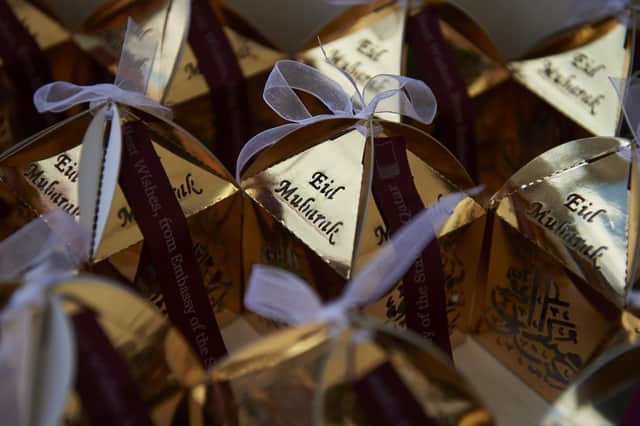When is Big Eid? Date for Eid ul-Adha and the meaning behind the celebration


An important date in the Islamic calendar is approaching.
More than three million Muslims will celebrate Eid ul-Adha in the UK starting from Saturday.
Eid ul-Adha, also known as Eid Al-Adha, or ‘Big Eid’, is the second Eid celebration in the religious annual Islamic calendar and is due to take place this weekend.
Advertisement
Hide AdAdvertisement
Hide AdThe first Eid, known as ‘Little Eid’, was marked at the beginning of May, celebrating the end of the month-long fast of Ramadan, where all abled Muslims fast from sunrise to sunset.
Eid ul-Adha, which is considered to be the holier of the two Eids, is a celebration to commemorate Prophet Ibrahim’s devotion to Allah, who was willing to sacrifice his son, Ismail.
Like most festivals that fall in the Islamic calendar, Eid ul-Adha doesn't fall on the same date every year due to being tracked by the moon.
According to Islamic tradition, Eid ul-Adha falls on the 10th day of Dhu al-Hijjah - the twelfth and final month in the Islamic calendar.
Advertisement
Hide AdAdvertisement
Hide AdEid-ul-Adha coincides with Hajj, a pilgrimage to Mecca that all able-bodied worshippers must make at least once as part of the five pillars of Islam.
Here is everything you need to know.
When is Eid?
The exact day on which celebrations for Eid ul-Adha falls is dependent on the sighting of the moon, following the completion of the Holy Pilgrimage of Hajj in Saudi Arabia.
According to the Umm al-Qura Calendar of Saudi Arabia, which is based on calculations by the Institute of Astronomical & Geophysical Research in Riyadh, Eid ul-Adha will begin at sunset on Saturday, July 9.
Eid ul-Adha usually lasts four days so is expected to end at sunset on Wednesday, July 13. For other communities, it goes on for two or three days - depending on the customs of a particular country.
Advertisement
Hide AdAdvertisement
Hide AdIt is important to check with your Mosque about the exact dates as different communities follow different confirmed sightings of the moon.
What is the meaning behind Eid ul-Adha?
Eid ul-Adha is the second Eid celebration of the year, the first being Eid al-Fitr which took place in May following the end of Ramadan, which saw all abled-bodied Muslims fast from sunrise to sunset to repent and get closer to God.
The celebration of Eid ul-Adha, which is considered to be the holier of the two Eids, is to commemorate Prophet Ibrahim’s devotion to Allah, who was willing to sacrifice his son, Ismail.
At the point of sacrifice, Allah replaced Ismail with a ram, which was to be sacrificed in place of his son.
Advertisement
Hide AdAdvertisement
Hide AdThe original command from Allah was a test of Prophet Ibrahim’s commitment to obey his Lord’s command, without question.
How is Eid ul-Adha celebrated?
Traditionally, Muslims mark the occasion by sacrificing an animal - usually a lamb, goat or cow but it can be a different animal - and sharing the meat with loved ones or the needy.
The animal must be in good health and over a certain age in order to be sacrificed. The animal must be halal slaughtered, in accordance with Islamic tradition.
Eid ul-Adha is a public holiday in Muslim countries, but Muslims in the UK may take the day off work or school to celebrate this festival.
Advertisement
Hide AdAdvertisement
Hide AdMuslims will wear their best clothes for this occasion, go to mosque for prayers, and give money to charity to give poorer families the chance to have a proper Eid feast.
Mosques and community groups will often also arrange meals for the community to eat together.
What does Eid Mubarak mean?
The Arabic word mubarak translates as blessed while Eid means feast, festival or celebration, so Eid Mubarak can literally mean blessed celebration or blessed feast.
If you want to wish somebody “Happy Eid” the traditional way would be to greet them with “Eid Mubarak”,